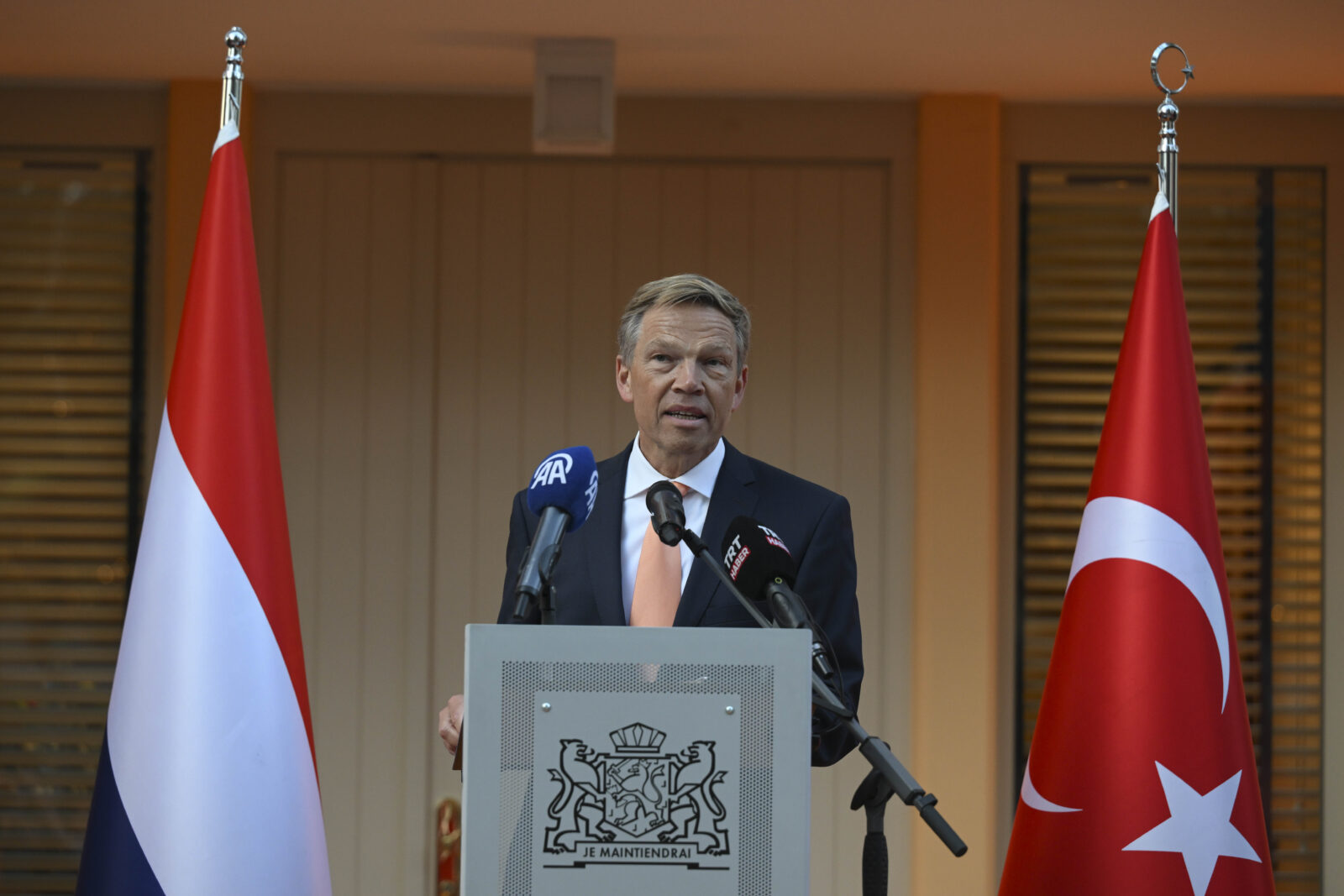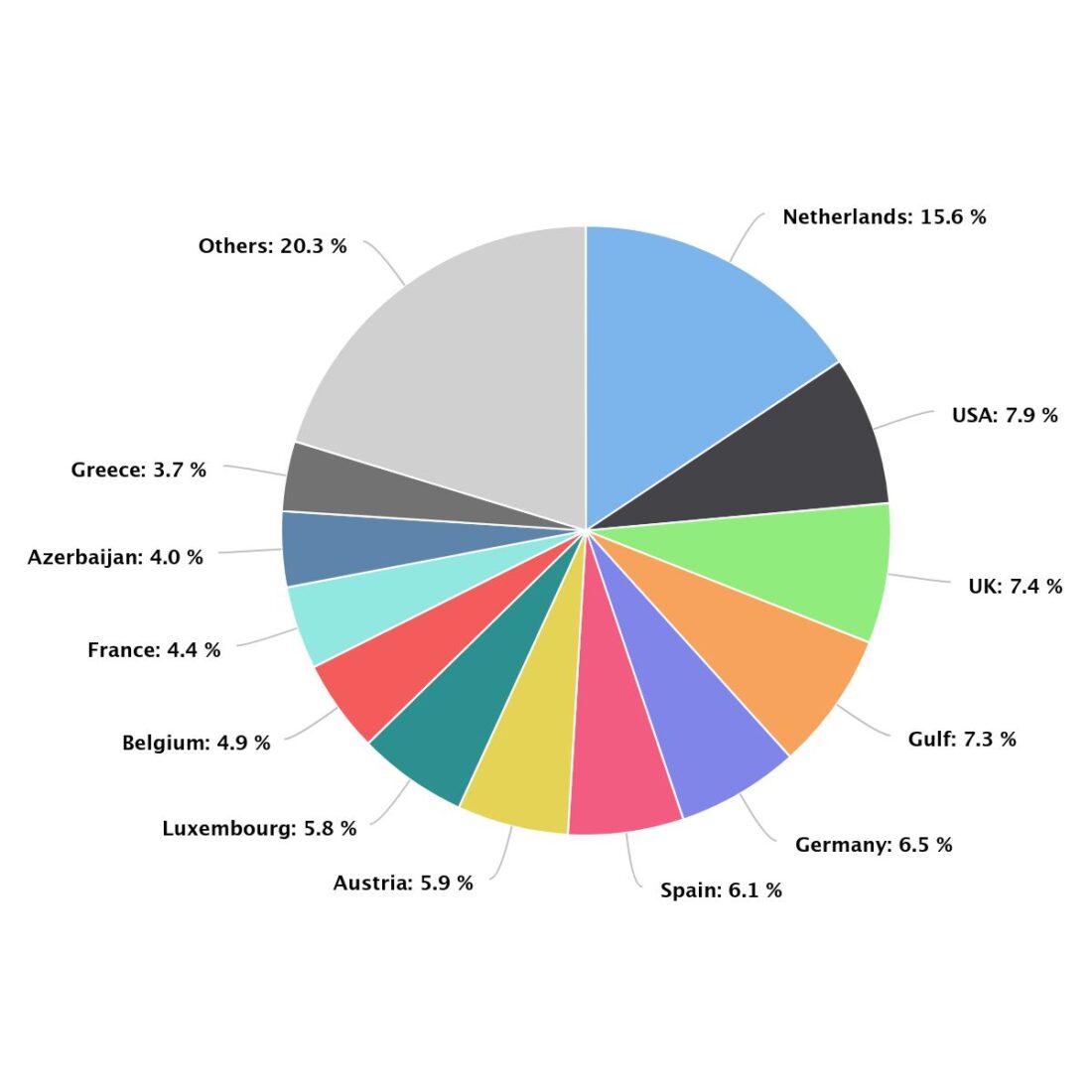
Türkiye’s Minister of Treasury and Finance Mehmet Simsek attended a reception hosted by the Dutch Embassy in Ankara on Tuesday to mark "King’s Day," the national day of the Netherlands. During his remarks, Simsek celebrated the occasion and emphasized that the friendship between Türkiye and the Netherlands dates back nearly five centuries.
Stressing the importance of economic ties between the two countries, Finance Minister Simsek described Türkiye and the Netherlands as key partners in trade and investment. He also addressed broader Türkiye–E.U. relations, emphasizing that modernizing the Customs Union—an agreement that enables the free movement of goods between Türkiye and the E.U. without tariffs or trade barriers—would be a mutually beneficial step.
Türkiye's Treasury and Finance Minister Mehmet Simsek delivers a speech during the King’s Day reception hosted by the Dutch Embassy in Ankara, Türkiye on April 29, 2025. (AA Video)
Simsek reiterated that Türkiye is highly competitive in strengthening its economic integration with the E.U. and argued that this modernization process should not be obstructed by domestic political considerations within Europe. Expressing hope that the Netherlands would support efforts to advance the Customs Union, he pointed to the strong and diverse cooperation already established between the two countries, particularly in defense and energy.
Simsek recalled that last year marked the centenary of the Treaty of Friendship—a formal agreement signed 100 years ago that laid the foundation for diplomatic relations between Türkiye and the Netherlands—as well as the 60th anniversary of the Labor Agreement, a bilateral deal signed in the 1960s that enabled Turkish citizens to work in the Netherlands, shaping today’s vibrant Turkish-Dutch community.
Highlighting the Netherlands as one of Türkiye’s most important economic partners, Simsek noted that the bilateral trade volume reached $13 billion in 2024. He also pointed out that the Netherlands is currently the largest foreign investor in Türkiye, and that 1.3 million Dutch tourists visited Türkiye in the same year.
Expressing Türkiye’s desire to strengthen ties in trade and investment, Simsek emphasized the country’s dynamic and diversified economy, robust infrastructure, and skilled labor force. He invited more Dutch investors to explore opportunities in Türkiye, while acknowledging that many Turkish entrepreneurs also choose to establish a presence in the Netherlands.
Speaking on the global economic outlook, Simsek noted that the world is experiencing a period of increased uncertainty. He observed that protectionist tendencies have grown since the global financial crisis and said that uncertainty remains a dominant factor today. According to Simsek, the best response to protectionism is deeper regional integration, which is why a stronger economic alignment between Türkiye and the European Union is essential.
Referring to the Draghi report—a policy paper authored by former European Central Bank President Mario Draghi outlining strategies to enhance the European Union's economic and financial resilience—Simsek noted that it calls for a more integrated Capital Markets Union (CMU). This refers to the E.U. initiative aimed at creating a single market for capital, making it easier for businesses to access funding across member states and reducing dependence on bank financing. Simsek argued that the E.U. must engage more closely with neighboring countries, including Türkiye, to advance this goal.
He stated that Türkiye has made progress in areas emphasized in the report—such as digital transformation (the adoption of digital technologies across sectors), the green transition (shifting to a sustainable, low-carbon economy), innovation (the development and application of new technologies or methods), and supply chain resilience (the ability of supply systems to withstand and recover from disruptions).
Dutch Ambassador to Türkiye Joep Wijnands also delivered remarks at the event, explaining that King’s Day celebrates the birthday of King Willem-Alexander and that it is customary to wear orange, the royal family’s color, in reference to their surname "Van Oranje."

Ambassador Wijnands emphasized the long-standing partnership between the Netherlands and Türkiye, pointing out that diplomatic and commercial ties between the two nations date back more than 400 years. “Trade is in both our nations’ DNA,” he said, adding that the Netherlands accounts for 23% of all foreign direct investment in Türkiye, making it the country’s top foreign investor. He also noted that 25% of Turkish outbound investors have chosen the Netherlands, which has become the number-one investment destination for Turkish businesses.
According to balance of payments data released by the Central Bank of the Republic of Türkiye (CBRT), foreign direct investment (FDI) inflows into Türkiye rose by 5.6% in 2023 to reach $11.3 billion. The Netherlands ranked first among investing countries, accounting for a 23.6% share. Between 2003 and 2023, the Netherlands made up 15.6% of Türkiye’s total FDI inflows.

Wijnands emphasized that the bilateral relationship goes beyond economic ties, describing the two countries as NATO allies navigating both historical and emerging geopolitical challenges. “We are NATO partners in a world facing many old and new geopolitical challenges. The Netherlands values Türkiye’s significant contributions to NATO’s core missions,” he said. He also mentioned that this year’s NATO summit will take place in The Hague in June, while next year’s summit will be held in Türkiye.
Noting Türkiye’s role in European cooperation, Wijnands described the country as a member of the Council of Europe, a candidate for E.U. membership, and a key partner in strengthening European security. “Our country increasingly feels that we need each other. We also believe that respect for fundamental rights and the rule of law is essential for further cooperation,” he said.
On the issue of visa procedures, Wijnands stated that the Netherlands is working hard to reduce appointment waiting times and that more visas were issued to Turkish applicants last year than ever before.
Beyond economic and security cooperation, Wijnands emphasized the unique human connections between the two countries, pointing out that nearly half a million people of Turkish descent live in the Netherlands.
Reflecting on his personal experience, Wijnands said he has lived in Türkiye for two and a half years and has learned a great deal from Turkish hospitality. He stated that Türkiye holds a special place in his heart and that he is honored to represent the Netherlands in such a beautiful country.
The reception opened with a performance by Dutch-Turkish soprano Aylin Sezer, who sang “On the Canals of Amsterdam.” She also performed the national anthems of both countries accompanied by the Turkish Naval Forces Orchestra.
The event was attended by Deputy Foreign Minister Mehmet Kemal Bozay, Ankara Mayor Mansur Yavas, and numerous high-level officials and guests.